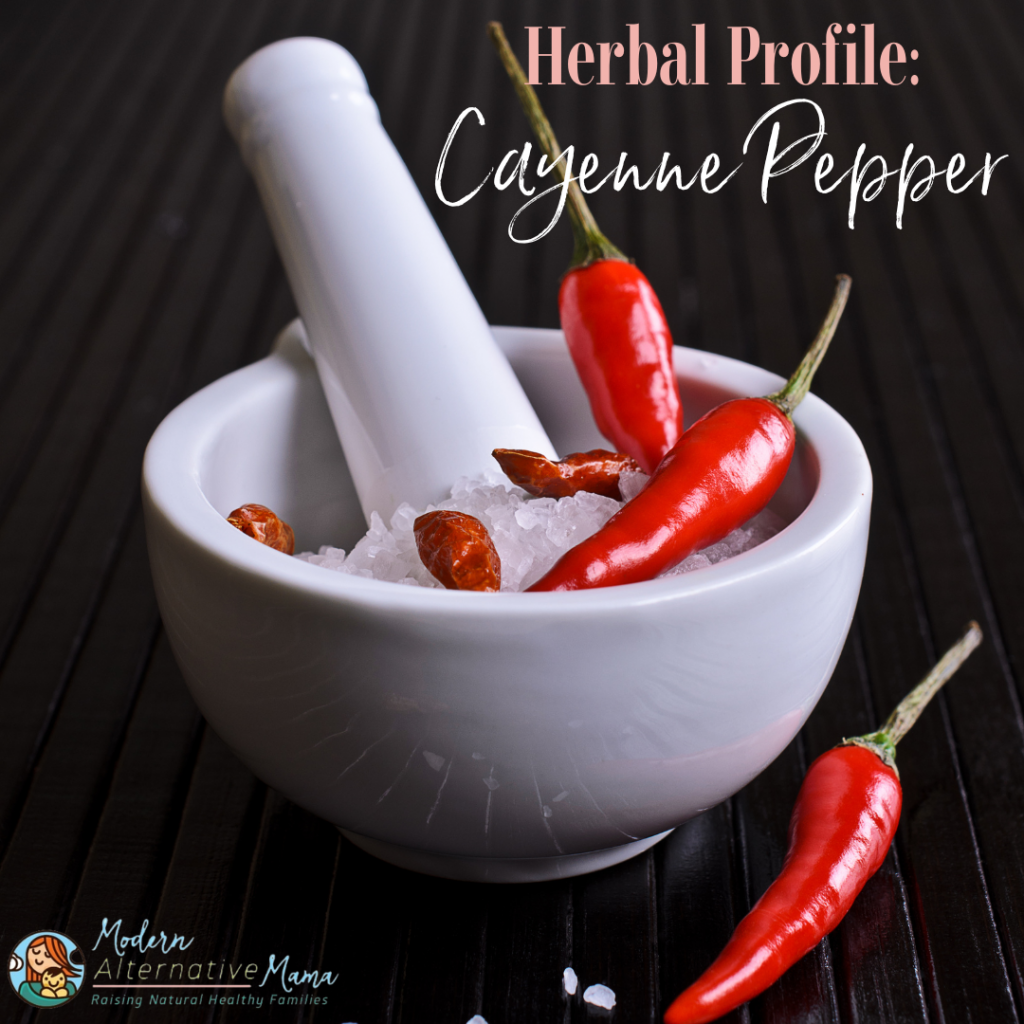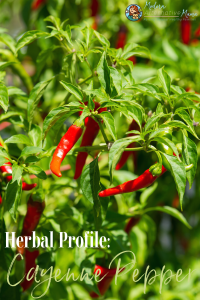What is Cayenne Pepper
Cayenne pepper is sometimes referred to as capsicum, African pepper, chillies,
bird pepper, or by its scientific name, Capsicum minimum. Cayenne pepper is a perennial vegetable of the Solanaceae family that grows 1-4 feet tall, 1-2 feet wide, and blooms in the summertime at temperatures above 65ºF (1). Although cayenne pepper was originally grown in South and Central America in pre-Columbian times, it was also cultivated in Mexico 7,000 years ago and in Peru 4,000 years ago. Additionally, Native Americans used cayenne as food and medicine for stomach aches, cramping pains, gas, and circulatory system disorders for 9,000 years (2).
Health Benefits of Cayenne Pepper
The active constituent that happens to be most studied in cayenne pepper is called capsaicin (3). Capsaicin has many known medicinal properties and a long history in traditional and alternative medicine. Most importantly, capsaicin has robust anti-inflammatory and antioxidant properties that provide many benefits, including:
Rich in Nutrients
Like all plants, cayenne pepper is brimming with nutrients that create many health benefits. Cayenne pepper is a rich source of fiber, calcium, iron, magnesium, phosphorus, potassium, folate, and vitamins A, C, and K (4).
Antioxidant Properties
Antioxidants can help fight damage from harmful free radicals. The buildup of free radicals has been linked to chronic diseases, such as cancer and heart disease (5). One study found that Capsicum annuum pepper varieties, including cayenne pepper, had the greatest antioxidant activity compared with other peppers (6). Animal studies indicate capsaicin is an efficient antioxidant in rats (7).
Anti-Inflammatory Properties
Thanks to its antioxidant compounds, cayenne pepper can reduce inflammation, especially from free radical damage. Chronic inflammation has been linked with many diseases, such as type 2 diabetes, asthma, and certain cancers (8). Cayenne pepper is an essential anti-inflammatory agent, improving insulin sensitivity, and counteracting dyslipidemia and weight gain (9). Additionally, animal studies have demonstrated that capsaicin-rich diets have favorable effects on atherosclerosis, metabolic syndrome, diabetes, obesity, non-alcoholic fatty liver, cardiac hypertrophy, hypertension, and stroke risk in mice (10).
Pain-Relieving Properties
As of 2016, an estimated 20.4% of U.S. adults (50.0 million) had chronic pain, and 8.0% of U.S. adults (19.6 million) had high-impact chronic pain (11). Thankfully the active ingredient in cayenne peppers, capsaicin, may have pain-relieving properties. A review noted that pain-reducing capsaicin cream, to reduce pain, may be beneficial for long-term use (12). Studies have found creams and ointments containing 0.0125% purified capsaicin may reduce pain and tenderness from osteoarthritis (13). Research also suggests oral capsaicin supplements may help relieve pain and discomfort in athletes (14).
May Support the Immune System
Cayenne pepper has been used in herbal remedies to fight colds, coughs, and congestion. A review noted that capsaicin might relieve symptoms such as sneezing, a stuffy nose, postnasal drip, and congestion, especially when allergies or smoking are not the cause (15). One study found that capsaicin nasal spray provided sustainable relief from cold symptoms within ten minutes of using it (16). Another study found cayenne pepper combatted group A Streptococci (the type of bacteria responsible for strep throat and other diseases), suggesting it may have antibacterial and antiviral properties (17).
May Promote Heart Health
Unfortunately, heart disease is the world’s number 1 cause of death (18). Due to the incredibly complex determinants of heart disease and various possible contributions, it’s hard to pinpoint an exact way to prevent it. Still, you can at least take steps to lower your overall risk. Cayenne pepper may be beneficial, especially since many researchers believe capsaicin may improve cardiovascular health, including blood vessel function (19).
Studies suggest that the capsaicin compounds in hot peppers may help reduce inflammation and oxidative damage, which could help protect against certain health conditions, including heart disease (19). One study found that 22,811 Italian adults who regularly consumed chili pepper had a lower risk of death from heart disease (20). A review of four observational studies found that chili pepper consumption was associated with a reduced risk of death from all causes (21,22).
May Help Control Diabetes & Blood Sugar Levels
As of 2020, 34.2 million (1 in 10) Americans have diabetes, and another 88 million (1 in 3) Americans have prediabetes (23). On the bright side, studies have found cayenne pepper to have anti-diabetic properties. An animal study found cayenne pepper reduced blood glucose by increasing insulin levels and glycogen content in streptozotocin-induced diabetic rats (24). Another study found capsaicin 8% patches to perform similarly to oral agents (i.e., pregabalin, duloxetine, gabapentin) in patients with painful diabetic peripheral neuropathy (25).
May Promote Skin Health
As mentioned earlier, cayenne pepper is suggested to have antibacterial properties that help protect the body from Streptococcus pyogenes, or group A Streptococcus. Aside from strep throat, group A Streptococcus can cause skin and soft tissue infections, such as impetigo and cellulitis (26). A review concluded capsaicin patches might reduce itching caused by various skin conditions, including psoriasis and issues resulting from dialysis (27).
May Aid in Weight Loss
Weight management is a challenge for most people in the U.S., with more than 70% of American adults being overweight (28). Excess body weight is a common contributor to type 2 diabetes, the most common type of diabetes. Being overweight increases your risk for type 2 diabetes, heart disease, and stroke (29). Thankfully, cayenne pepper may help.
Researchers found that after giving healthy volunteers a placebo or one of two dosages of capsaicin for 12 weeks, those who took the higher dosage (4 milligrams) experienced a reduction of nearly 6% in body fat (30). Another study found that consuming 1 gram of cayenne pepper in their meals slightly increased core body temperature resulting in burning additional calories. Some participants also reported having less desire to eat fatty, sweet, or salty foods after consuming capsaicin (31).
Safety Concerns
According to trusted herbalist Richard Whelan, cayenne is a remarkably safe herb, even though this seems surprising given how painful it can be when applied to delicate tissues. Cayenne’s burning sensation is caused by nerve stimulation, not by any physical harm to the tissues (although corneal abrasions, wheezing, and skin blisters can occur in some). The ultimate proof of the truth of this statement is shown by what happens when Pepper spray is used as a weapon against a person. Even though it must feel like their eyes are being utterly burned and blinded, there is generally no actual damage or lasting harm done to these most delicate tissues.
Too much of anything can be bad, and excess use of Cayenne may cause an overstimulation of the digestive tract. This said, we again see the great paradox of Cayenne in that it has been used to treat stomach ulcers (the herb causes a reflex coating over the gut due to the increased secretions, which can help the ulcer to heal). It is a very safe herb so long as it is used wisely (32).
There have been claims that cayenne pepper can stop a heart attack in its tracks.
Dr. Christopher claims to have never lost a patient to a heart attack and states:
“In 35 years of practice, and working with the people and teaching, I have never on house calls lost one heart attack patient, and the reason is, whenever I go in–if they are still breathing–I pour down them a cup of cayenne tea (a teaspoon of cayenne in a cup of hot water, and within minutes they are up and around). This is one of the fastest acting acids we could ever give for the heart because it feeds that heart immediately (33).”
An article claims this to be a hoax and medical misinformation, but they offer nothing but their word. Their article doesn’t provide any scientific evidence that states otherwise. The only scientific evidence I could find that says otherwise is a case where a 25-year-old experienced acute myocardial infarction and coronary vasospasm associated with ingesting cayenne pepper pills (34).
Two years after this man’s experience, the FDA advised consumers not to purchase or use La Jiao Shou Shen (the cayenne pepper pills he was using) due to containing sibutramine. Sibutramine is a controlled substance that was removed from the market in October 2010 for safety reasons (35).
With that said, chances are, the issue was the sibutramine, not the cayenne pepper, and I would be 100% comfortable using a cayenne pepper tincture as I wait for medical help if I were having a heart attack.
How to Use Cayenne Pepper
You can find cayenne pepper in dried bulk, pills, powders, teas, extracts, or tinctures. Tinctures always contain the most concentrated amount of herbs. Teas and soups are also options, especially when following ayurvedic medicine recipes. Some great articles to check out featuring the use of cayenne pepper include:
Follow the recommendations of any supplement; some of my recommendations include:
- Earthley’s Healthy Heart is an herbal supplement that supports the heart and a proper immune response. This tincture is rich in anti-inflammatory properties and vitamin C. It can help lower blood sugar and blood pressure, increase insulin activity, and even help with symptoms of type 2 diabetes.







